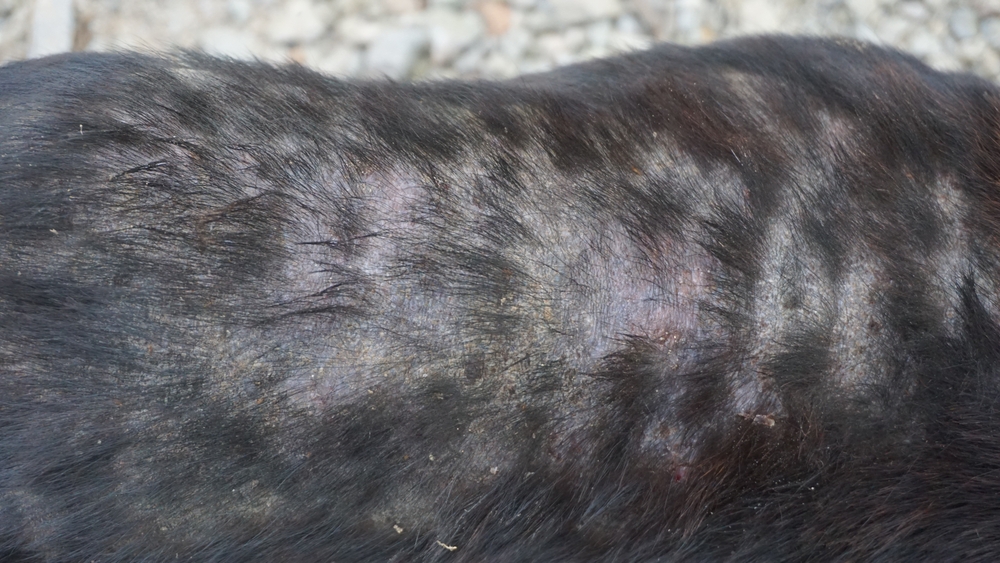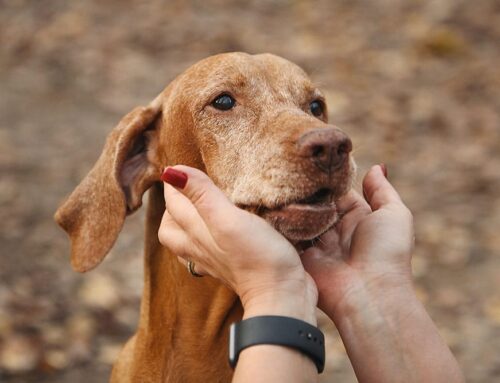From skin biting and chewing to infections and rashes, cats and dogs often experience various skin conditions that cause discomfort. Understanding these pet skin issues is crucial for providing proper care and ensuring your furry friend’s well-being. Our Mobile Cat & Dog Vet team explains common pet skin conditions and how to ensure your four-legged friend gets relief.
Flea allergy dermatitis in cats and dogs
Fleas are not only a nuisance but can also transmit diseases and trigger allergic reactions in cats and dogs. Flea saliva contains proteins to which some pets are hypersensitive, leading to:
- Intense itching
- Hair loss
- Rash
- Scabs
- Open sores
Prevention through regular flea control is critical to managing flea allergy dermatitis (FAD). Your pet needs year-round veterinarian-prescribed parasite preventives to guard against fleas, ticks, heartworms, and other parasites.
Atopic dermatitis in pets
Atopic dermatitis, or allergic dermatitis, is a chronic inflammatory skin condition caused by an allergic reaction to environmental substances such as pollen, dust mites, or certain foods. Atopic dermatitis is diagnosed through allergy testing and dietary changes, and medications are often prescribed to alleviate the condition’s impacts on your furry pal. Pets’ atopic dermatitis signs may include:
- Itching
- Redness
- Inflammation
- Recurrent ear infections
Acute moist dermatitis in pets
Acute moist dermatitis, commonly known as a hot spot, results in painful, moist, red lesions that can develop rapidly. These lesions are typically self-inflicted and commonly occur in response to an underlying skin irritation or allergy, and your pet’s incessant skin licking, scratching, or biting. This condition is treated by clipping the fur around the affected area, cleaning the wound, and administering topical or oral medications to promote healing and relieve itching.
Ringworm in cats and dogs
Contrary to the condition’s name, ringworm is not caused by worms but by a skin, hair, or nail fungal infection. Ringworm—dermatophytosis—is highly contagious and can spread between pets and people. Signs include:
- Circular bald patches
- Redness
- Itchy skin
- Scaling
Dermatophytosis treatment typically involves antifungal medications and disinfecting your pet’s environment to prevent further spread. Because ringworm is contagious, use gloves when applying topical medications and quarantine your pet from other pets and family members until they are ringworm-free.
Ear infections in cats and dogs
Ear infections—otitis externa—are common in dogs, particularly those with long, floppy ears or excessive hair growth in the ear canal. Ear infections are treated through ear cleaning and topical or systemic medication administration to eliminate the underlying disease. Keep in mind that a pet’s ear infection can be an allergy’s secondary condition. Pets’ ear infection signs include:
- Head shaking
- Ear sensitivity to touch
- Ear scratching
- Foul odor
- Discharge
Pets’ allergies to food
Food allergies can contribute to pet skin conditions, including itching, redness, and inflammation. Common allergens include proteins such as beef, chicken, dairy, and eggs. Diagnosis often involves eliminating and reintroducing specific ingredients to identify the culprit. Treatment requires strict avoidance of the offending food and may include prescription diets or hypoallergenic formulas.
Seborrhea in cats and dogs

Seborrhea occurs because of oily skin (Seborrhea oleosa) or dry, flaky skin (Seborrhea sicca). Breeds, including West Highland white terriers, basset hounds, and cocker spaniels, are predisposed to these conditions. Treatment entails medicated shampoos, dietary supplements, and underlying condition management.
Skin conditions can significantly impact your furry friend’s health and quality of life. While some skin issues may be relatively minor and easily managed, others may require veterinary intervention and long-term care. However, if your beloved pet companion is nearing the end of their life, call Mobile Cat & Dog Vet for compassionate palliative, hospice, and euthanasia services.








Leave A Comment